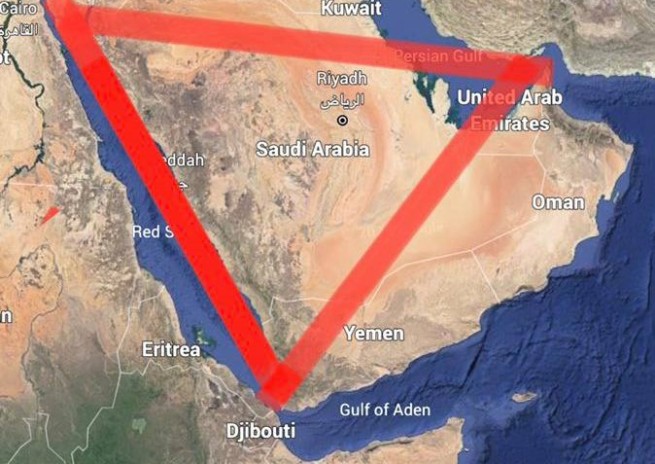The Houthis will close three ends of the Arabian Peninsula to prevent oil from flowing into Israel from the Strait of Hormuz, the Bab al-Madab Strait and the Suez Canal by blocking the so-called Al-Aqsa Triangle with missile attacks, as information was leaked US plans to invade Yemen and bomb targets in Iran.
The Houthis have Typhoon missiles in their arsenal, a modified version of the Iranian Qadr ballistic missile with a range of 1,600-1,900 kilometers and increased accuracy.
In 2022, Yemen’s Houthi-owned Qud missiles attacked oil facilities in Abu Dhabi, the capital of the United Arab Emirates, located 1,126 km north of Yemen. These missiles have already been used by the Houthis in attacks on targets in Saudi Arabia.
Production of ballistic missiles, strike drones, cruise missiles, etc. has intensified, with British sources reporting that underground factories in the vast Yemeni desert are producing more than 30 such weapons a day.
BREAKING:
⚡ 🇾🇪🇮🇱Reports from Yemen that the Houthis plan to close all three waterways in the Middle East.
According to an exclusive Yemeni source, Ansarullah is considering implementing a plan they call the 'Al-Aqsa Triangle', by closing all three of the Middle East's major… pic.twitter.com/Nkk0iZ2mo0
— Megatron (@Megatron_ron) January 20, 2024
According to reports from Yemen, the Houthis plan to close all three waterways in the Middle East.
According to an exclusive Yemeni source, Ansarullah is considering implementing a plan they call the Al-Aqsa Triangle by closing all three major waterways in the Middle East: Bab al-Mandab, Strait of Hormuz and Suez Canal.
This will stop the supply of oil and gas to Israel from Qatar, the UAE and Saudi Arabia.
Leading US CENTCOM officials are recommending that the White House land in western Yemen and bomb Iranian areas from where the Iranians are sending all sorts of supplies – from ammunition and spare parts to medical personnel for the Houthi militia.
According to CENTCOM, this is the only way to suppress Houthi activity and ensure safe passage of ships in the southern Red Sea and Gulf of Aden. The participation of ground forces involves landing troops and controlling ports such as Hodeidah in western Yemen.
US Central Command CENTCOM (AOR) is the unified combatant command of the US Department of Defense, whose area of responsibility includes the countries of the Middle East, parts of North Africa and Central Asia, in particular Afghanistan and Iraq.
CENTCOM has been the primary U.S. presence in many military operations, including the Gulf War (Operation Desert Storm, 1991), the War in Afghanistan (Operation Enduring Freedom, 2001-2014), and the Iraq War (Operation Iraqi Freedom). , 2011).
As of 2015, CENTCOM forces were deployed primarily in Afghanistan until the Taliban were ousted in 2021, Iraq, and Syria.
CENTCOM is headquartered at MacDill Air Force Base, Tampa, Florida.
In 2002, a central headquarters was established at Camp Al-Shailiya in Doha (Qatar), which was transferred to a forward headquarters at Al-Udeid Air Force Base (Qatar) in 2009.
The fact is that since 2001, CENTCOM has had two defeats and one consolidation of control, thanks to the Syrian oil Kurds, whose oil is stolen by the Syrians and then sold on international markets by American companies.
A complete defeat in Afghanistan and a partial defeat in Iraq, where its bases are now the target of missiles from Shiite militias almost daily, do not represent an impressive record of CENTCOM’s performance.
⚡️BREAKING
In an unprecedented move, Iraq has refused the entry of additional US forces into its territory.
The start of negotiations to remove US forces are imminent, says Iraqi army spokesman pic.twitter.com/XAp8iYxr88
— Iran Observer (@IranObserver0) January 20, 2024
In an unprecedented step, Iraq refused to send additional US forces to its territory. The start of negotiations on the withdrawal of American troops is inevitable, says an Iraqi army spokesman.
With 10,000 people killed and an unknown number wounded since 1991, it has been the worst fire for American military commanders in 33 years.
The White House has not yet decided whether to greenlight the US Army operation. Apparently some in Florida believe their troops are safe from reprisals from Yemen’s hostile 37 million population who say, “Death to the Americans.”
The well-known simplistic approach of American agencies like CENTCOM, especially after the results of the last 23 years, is not easy to explain…







More Stories
On "Eurovision" voting stopped due to scandal with Dutch representative
Car with a symbol "Z" not allowed into the territory of Lithuania
In St. Petersburg, a bus with 20 passengers fell into the Moika River